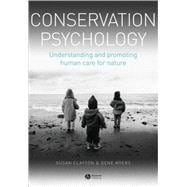
Note: Supplemental materials are not guaranteed with Rental or Used book purchases.
Purchase Benefits
What is included with this book?
Olin Eugene (Gene) Myers Jr. is Associate Professor at Huxley College of the Environment at Western Washington University, where he offers courses in conservation psychology, human ecology, environmental ethics, and is extensively involved in undergraduate and graduate programs in environmental education. His research interests are wide-ranging and include psychology and anthrozoology as applied to conservation.
| Acknowledgments | p. viii |
| Introducing the field of conservation psychology | p. 1 |
| Conservation | p. 2 |
| Psychology | p. 2 |
| Human care for nature | p. 5 |
| The roots of conservation psychology | p. 6 |
| The potential of conservation psychology | p. 7 |
| The organization of this book | p. 10 |
| Conclusion | p. 11 |
| Thinking about nature | p. 13 |
| Attitudes, values, and perceptions | p. 15 |
| Core understandings of nature | p. 15 |
| Risk perception | p. 22 |
| Biases in information processing | p. 24 |
| Language and discourse | p. 27 |
| Who is responsible? | p. 30 |
| Linking perceptions to behavior | p. 31 |
| Conclusion | p. 33 |
| Moral psychology and the environment | p. 34 |
| Background in ethical concepts | p. 35 |
| A virtue ethics of the environment | p. 35 |
| The Deontic tradition and psychological research | p. 39 |
| Contextual differences in moral duties | p. 43 |
| Consequentialism, emotion, and socialization | p. 45 |
| Psychological dynamics of moral functioning | p. 48 |
| Pragmatist ethics | p. 50 |
| Conclusion | p. 53 |
| Environment and identity | p. 54 |
| The concept of identity | p. 54 |
| Identity development | p. 55 |
| Developing an affiliation with nature | p. 58 |
| Environmental identity | p. 59 |
| Measuring environmental identity | p. 61 |
| Place identity | p. 62 |
| Animals and identity | p. 65 |
| Environmental social identity | p. 66 |
| Identity and behavior | p. 68 |
| Putting identity to work | p. 70 |
| Conclusion | p. 72 |
| Theoretical foundations for the human response to nature | p. 73 |
| The heritage of environmental psychology | p. 73 |
| Ecological perception and psychology | p. 74 |
| Evolutionary psychology and biological thinking | p. 78 |
| Biophilia | p. 81 |
| Combining nature and nurture | p. 84 |
| Experiential approaches | p. 86 |
| Conclusion | p. 88 |
| Interactions with nature | p. 89 |
| Domestic nature: Cohabiting with animals and plants | p. 91 |
| Animals in the home | p. 91 |
| Plants in the domestic sphere | p. 100 |
| Conclusion | p. 104 |
| Managed nature: Zoos, aquariums, and public parks | p. 106 |
| Zoos and aquariums | p. 107 |
| Urban parks and green spaces | p. 116 |
| Conclusion | p. 120 |
| Wild nature: Encounters with wilderness | p. 121 |
| Defining wilderness and wild nature | p. 121 |
| Wilderness use and wilderness Values | p. 123 |
| Wilderness solitude | p. 125 |
| Natural forces and features | p. 127 |
| The edge of control: Wilderness remoteness and challenge | p. 132 |
| Activity in wild nature, connection and caring | p. 135 |
| Wild nature and spiritual experience | p. 136 |
| Conclusion | p. 139 |
| Promoting conservation | p. 141 |
| Promoting sustainable behavior | p. 143 |
| Identifying target behaviors | p. 143 |
| Influences on behavior | p. 145 |
| Models for changing behavior | p. 156 |
| Collective behavior | p. 157 |
| Changing the ideology of consumerism | p. 159 |
| Conclusion | p. 160 |
| Community psychology and international biodiversity conservation | p. 162 |
| International biodiversity conservation | p. 163 |
| Common pool resources and models of governance | p. 164 |
| Psychology, culture, and local knowledge | p. 170 |
| Accounting for the costs and benefits of conservation | p. 172 |
| Conservation and all-too-human psychology | p. 177 |
| Conclusion | p. 178 |
| Environmental education | p. 180 |
| Environmental education | p. 181 |
| Examples of contemporary environmental education | p. 185 |
| Psychological foundations of environmental education | p. 189 |
| Lessons for effective practice | p. 195 |
| Conclusion | p. 197 |
| The psychology of hope | p. 198 |
| Human response to threatening circumstances | p. 198 |
| Optimism and pessimism | p. 200 |
| An alternative to a focus on outcomes: Creating meaning | p. 204 |
| Glossary | p. 207 |
| References | p. 213 |
| Index | p. 246 |
| Table of Contents provided by Ingram. All Rights Reserved. |
The New copy of this book will include any supplemental materials advertised. Please check the title of the book to determine if it should include any access cards, study guides, lab manuals, CDs, etc.
The Used, Rental and eBook copies of this book are not guaranteed to include any supplemental materials. Typically, only the book itself is included. This is true even if the title states it includes any access cards, study guides, lab manuals, CDs, etc.